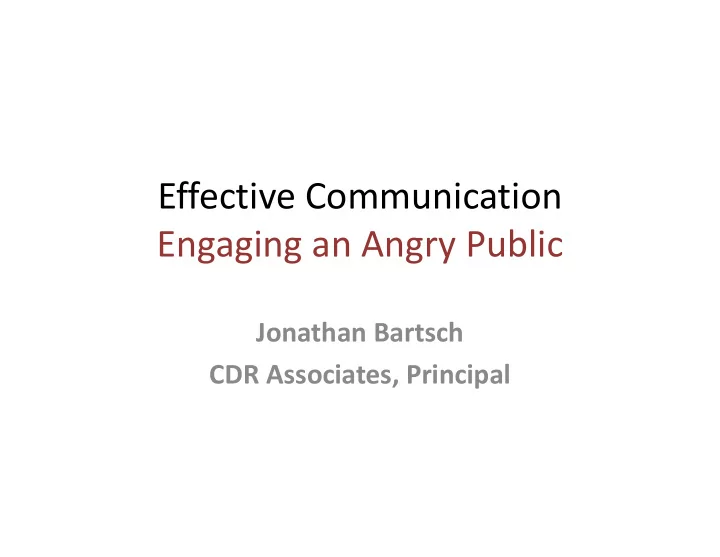

Effective Communication Engaging an Angry Public Jonathan Bartsch CDR Associates, Principal
Agenda • Why is the Public Angry? Does it matter? Who is the Public? • Spectrum of Public Engagement • How Do We Effectively Engage – Interests • Communication On the Basis of Interests • Listening, Framing and Reframing 2
Why is the Public Angry? • Hurt or Impact, Actual or Perceived • Threatened by Risks – Health, Economic, Hydrologic, Environmental • Fundamental Beliefs are Challenged • Not Treated Fairly or Respectfully • For Show and Mobilization 3
Does it Matter if the Public is Angry? • Undermines competitiveness • Erodes confidence in basic institutions • Increase cost from lawsuits, legislative initiatives • Money for fighting cannot be used to address other problems • Agencies and organizations don’t take risk, think as creatively or perform as effectively 4
Who is the Public? • Support • Oppose • Majority ‐ “Guardians”
The Spectrum of Public Engagement Level of Collaboration LOW HIGH Decide- Decide with Consultation Concurrence Consensus announce- input defend
How Do We Engage to Prevent and Resolve Public Controversies? • Engage in Mutual Education • Focus on Interests • Communicate Effectively • Commit to Addressing Negative Impacts
Interests
Types of Interests Substantive Interests: Our tangible, measurable needs Procedural Interests: Our needs related to the process Psychological Interests: Our needs related to how we are treated and how we want to feel about ourselves and others 9
Questions to Get at Interests • Why is that important to you? • What would your suggested solution accomplish? • What do you like about what is being proposed? • What concerns do you have about what is being proposed? 10
Communication on the Basis of Interests 11
Effective Communication Effective Communication Feelings COMMUNICATION Project Staff Public Content
Active Listening Listen and distinguish between substantive and emotional • • Paraphrase the emotional content • Listen for the speaker’s response…they will confirm whether you captured their emotion/intensity accurately 13
Characteristics of a Good Listener • It genuinely matters to me, even if I disagree • I am willing to hear angry comments • I give all of my attention and focus • I focus on emotional content as I focus on substantive content • I check out what I think I heard • When I need to, I follow with an open-ended question to get more
FRAMING State (frame) the issues or the problem in a clear, direct way that evokes a receptive, constructive response
REFRAMING Listen to toxic, positional, threatening statements and translate (reframe) them into problem statements or statements of concern that others and we can respond productively to.
PRINCIPLES OF REFRAMING • Every strong statement contains some underlying interest or concern that prompted the strong statement. • People usually want a constructive response to their statements. • People can switch to more productive communication when they believe that their needs are being
How Do You Reframe? • Listen for feeling and substance • Remove what is unproductive • Look for interests (Triangle of Interests) • Restate – What is important to you is… – What concerns you is… – You need… 18
Transcript Exchange (Continued) • What is the content? The emotion? • What is the position? The interests? • How would you reframe the statement? 19
A Paradigm Shift CHANGE THE DYNAMIC From positional approach To interest-based problem solving
Effective Communication with the Public • Acknowledge Anger and Concerns • Engage in Mutual Education • Focus on Interests and problem solving • Communicate effectively listen, frame and reframe 21
Effective Communication Engaging an Angry Public Jonathan Bartsch CDR Associates, Principal
Recommend
More recommend